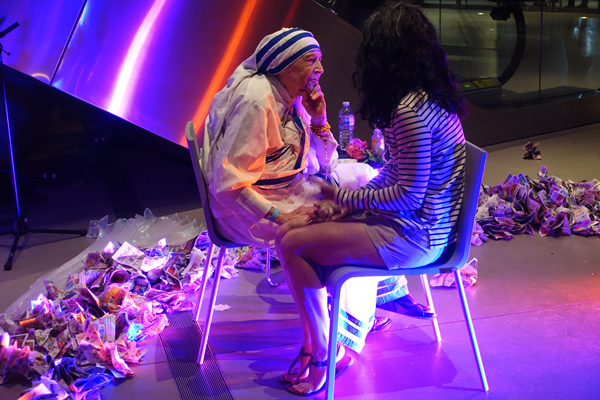Artists and curators Ron Athey and James Spooner know that Los Angeles has become the art world omphalos and so decided to convert last Saturday’s Broad Happening into a 21st century Oracle of Delphi. Hosted in alignment with the Broad’s current multimedia show Oracle, which prognosticates on global anxiety and surveillance, the Happening featured artists who prophesied whether the earth will survive its current travails or careen off the cliffs of war and warming.
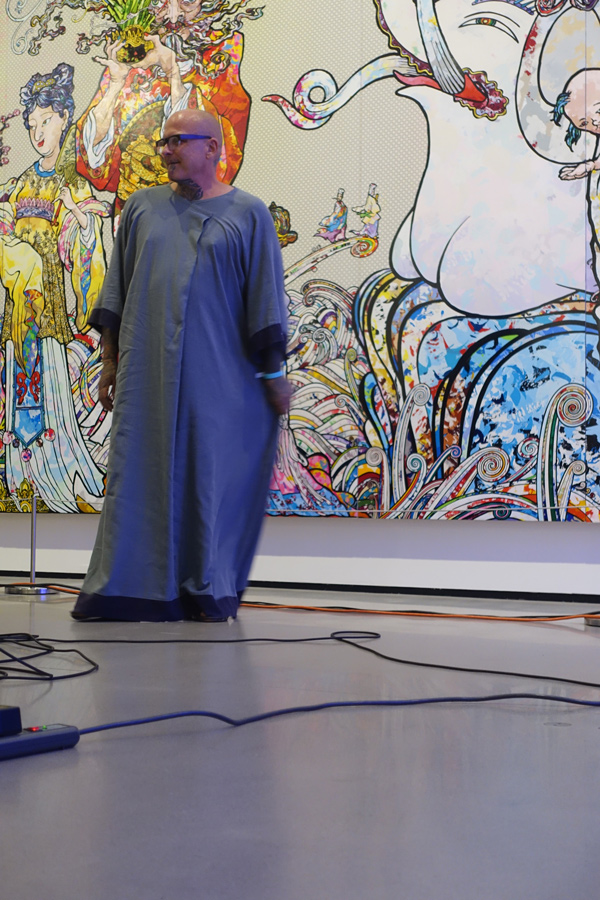
Ron Athey
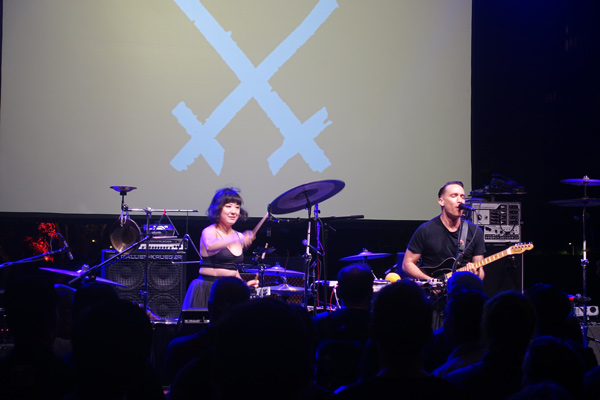
Xiu Xiu
Artillery arrived just in time to revel in the hurting optimism of Xiu Xiu, an ecstatic techno marvel whose lead, Jamie Stewart, caterwauled odes to “stupid and lonely” feelings as Angela Seo bashed magically on her drums. Xiu Xiu’s screamy and melancholy energy inspired people to thrash about like maniacs as if they, too, had been made brave by Dionysus. Caught up in the music, we here at Artillery suddenly felt less panicked by Charlottesville, coal miners, Harvey, and possible DACA annihilation. We wriggled along with the crowd while Stewart blasted accurate predictions like Everyone hates you/Pain has just begun/Everyone loves you/Pain has just begun.
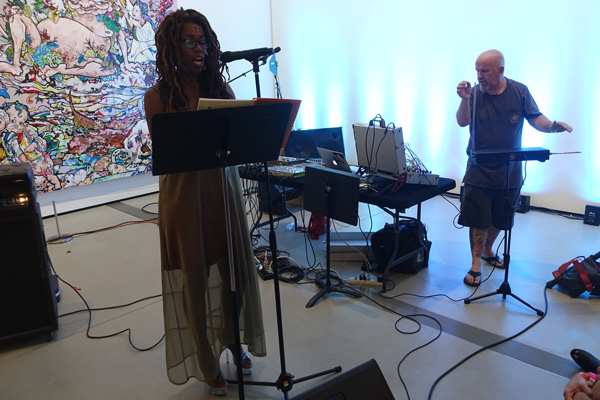
Lisa Teasley and David Harrow
Lisa Teasley (a close friend of Artillery’s, caveat lector) and musician David Harrow continued to guide us on this Odyssey with an accompanied long poem, which Teasley declaimed in true sibylline style in the third floor’s “Xenolalia Room.” Xenolalia signifies the speaking of an unlearned language, and Teasley’s beautiful spoken opera about the travels of the Magdalene dared the audience to make meaning in a Jabberwocky era. Teasley, the author of Glow in the Dark and Dive, stood before a lectern in a gauzy dress and an indomitable mien as she pronounced challenges like Here I go for the rebirth of my signature frequency/ I am in many locations and many moments while Harrow performed a score of whale-song on a handless Theremin. Harrow, a musical polymath, spent his career in a hero’s journey that has seen him engaging disco, post-punk, drum-n-bass, trance, reggae and dub. Audience members sat at Teasley’s feet and let the two artists’ combined sounds transport them into a swoony state.
Soon it came time for a more literal healing at the hands of Linda Mary Montano, a performance artist and radically reformed Catholic whose endurance with painful illnesses led her to embrace manifold personas. Montano lives by the directive that her life is her art, and her intimacy with suffering inspired her to adopt the identity of Mother Teresa, the canonized saint. Everybody at the Broad seemed to want a piece of Montano/Teresa, who administered blessings in the lobby the whole night. Montano sat in nun robes on a white plastic chair, with an open seat next to her. An incongruous aide wearing a Clinique-looking white smock and an “Addicted to Love” hairbun and red lipstick levitated about, taking names down on a long list. A horde of hopefuls waited around for their turn to feel seen by Montano.
When the Clinique pharmacist finally called Artillery’s number, we sat next to Montano and looked deep into her sweet, lined face. Montano smiled at us and nodded.
“What do you want?” she asked, in a sort of Santa way.
“Nothing,” we lied.
“Okay,” Montano said. “We can sing a song.”
“That sounds good,” we said.
Montano grasped us by the back of the neck and placed her head up to ours. She began singing Brahms’ “Lullaby and Goodnight,” and rocked us energetically back and forth. We warbled along until we both forgot the lyrics and just yodeled it and began laughing.
Lullaby and goodnight, with roses bedight
With lilies o’er spread is baby’s wee bed
La da daaa, laa da daaa, la da daa daaaaaaa
Neither atheism nor existentialism could keep us from feeling jubilant as we leapt up from our seat to see the next act. But it was here that we paid the price for our cosseting: :Black queer femme performance artist Keijaun Thomas understood that in the current climate the Broad’s soothsaying should not just make the bourgeoisie feel great. Having outfitted the Oculus hall with unguents, scissors, plastic tarps, beer bottles, and a host of other props, she engaged Broad patrons in a lengthy teaching lesson that offered both bitterness and maybe something approaching love.
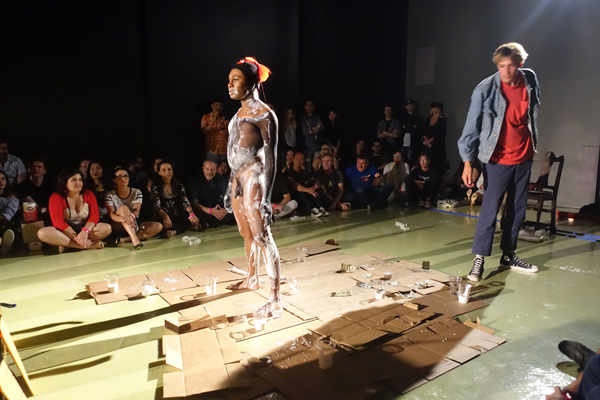
Keijaun Thomas
Thomas began dancing, nude and tossing about a red ponytail attached to a little hat. A nylon mask smushed her face. She then began asking audience members to pour white glue on her legs, her ass, her torso; she poured it over her own mouth, then tore off the mask. Thomas asked a woman to rip off some fishnet she had tied around her own (that is, Thomas’) torso and penis. The patron did so, gamely, but afterwards found herself with hands full of Elmer’s that she didn’t know what to do with, and her smile wore off. We felt the stickiness and sickeningness of white supremacy and queerphobia as Thomas crawled around the ground, explaining to the audience that she “couldn’t stand” us. Then she began dancing like a stripper and demanding that we throw dollars at her, which she stuck to her body. From having watched a previously-filmed video of Thomas’ action, titled Distance is Not Separation, we suspected that this iteration would end with some gestures of outreach and tenderness. Still, Thomas’ is difficult, painful art, a haruspication that does not augur a just or restful future.
We slipped out in time to catch the last moments of A Place to Bury Strangers’ set. The band specializes in moody wall-of-sound “shoegaze” music, which involves a lot of pedal work and stage fright. The plaza stage coruscated with lightning and mist, through which we could see the dim specters of men hop about. Guitars screeched and drums deafened; the crowd roared with glee.
We stood on the plaza and watched the kliegs dim, while humming “Lullaby and Goodnight” in our head. We tried to retain that courageous feeling encouraged by Xiu Xiu and Teasley. But a chilled breeze seemed to envelop us, despite the high-alert heatwave that had already begun to mount. Thomas had reminded us of what the future boded and not even music could help.
It didn’t take but a few moments for the old dread to come rushing back.
Photos by Chris Jarvis
:Editor’s Note: N.B. Keijaun Thomas has written in to teach Artillery that she does not identify as a male-born artist, and that to use such terms when describing her is “reductive, assuming and hurtful.” Yxta Maya Murray, the author of the piece, personally apologies for the use of this language and has removed it from the copy. Many thanks for Keijaun Thomas for her work and for her reaching out to correct this insensitive use of language. —ymm

